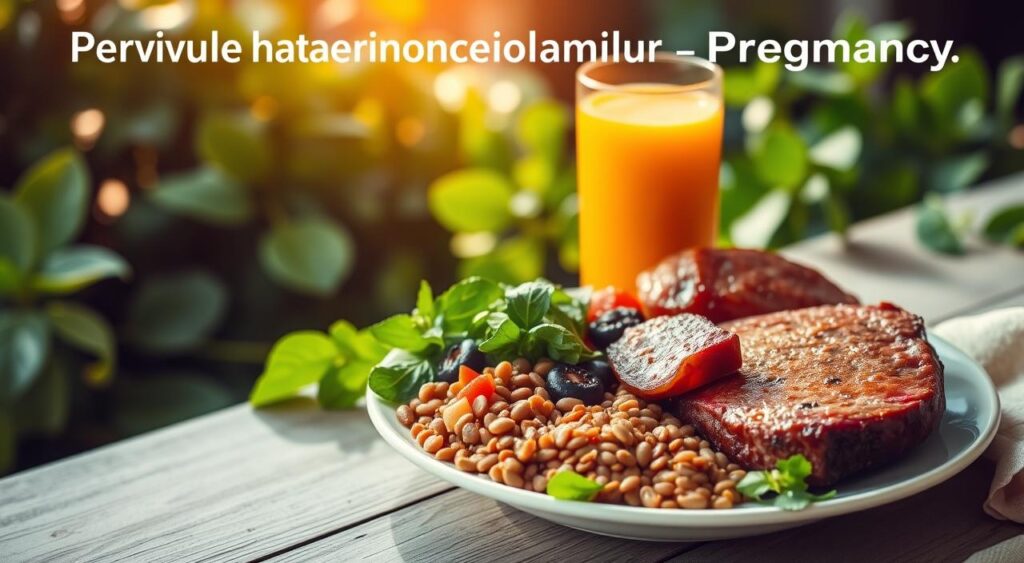About 50% of pregnant women worldwide face anaemia of pregnancy. This is a big health issue. It happens when the body doesn’t have enough healthy red blood cells. This makes it hard for the body’s tissues to get enough oxygen.
This condition is serious for both the mother and the baby. It’s very important to know about pregnancy-related anaemia.

It’s key for expectant mothers to understand anaemia of pregnancy. This knowledge helps them prevent it and get help if they need it. Anaemia can be caused by not enough iron, vitamins, or chronic diseases.
By knowing the signs and symptoms, women can manage the condition. This ensures a healthy pregnancy for them and their baby.
Key Takeaways
- Anaemia of pregnancy affects approximately 50% of pregnant women worldwide
- Iron deficiency anaemia in pregnancy is the most common type of anaemia during pregnancy
- Pregnancy-related anaemia can have severe consequences for both the mother and the baby
- Understanding the causes and symptoms of anaemia in pregnancy is crucial for expectant mothers
- Early detection and treatment of anaemia of pregnancy can help prevent complications
- Expectant mothers can take preventive measures to reduce their risk of developing anaemia in pregnancy
Understanding Anaemia of Pregnancy
Anaemia is a common issue for many pregnant women. It causes symptoms like fatigue, weakness, and shortness of breath. Knowing the causes, such as iron and vitamin deficiencies, is key to treating it.
Pregnancy raises the risk of anaemia because the body needs more iron and nutrients. If these needs aren’t met, iron deficiency anaemia can occur. It’s important to understand anaemia types and blood levels to catch it early.
Definition and Types
Anaemia in pregnancy can be iron, vitamin, or chronic disease-related. Each type has its own causes and symptoms. Knowing these differences helps in treating anaemia effectively.
Why Pregnancy Increases Anaemia Risk
Pregnancy ups the risk of anaemia because the body needs more iron and nutrients. If iron needs aren’t met, iron deficiency anaemia can happen. Pregnancy also lowers red blood cell count, adding to the risk.
Normal vs. Anaemic Blood Levels
Knowing normal vs. anaemic blood levels is crucial. Normal levels mean healthy red blood cells, while anaemic levels mean low counts. Regular blood tests can spot anaemia early, leading to timely treatment.
Common Causes of Pregnancy-Related Anaemia
Iron deficiency anaemia is common in pregnant women. It’s important to prevent it for a healthy pregnancy and delivery. Anaemia screening in prenatal care is key to spotting at-risk women early.
Causes of pregnancy-related anaemia include:
- Iron deficiency from a diet lacking iron or increased iron needs during pregnancy
- Vitamin deficiency, especially folate or vitamin B12
- Chronic diseases like kidney disease or rheumatoid arthritis that can cause iron deficiency anaemia
Knowing the causes of anaemia is crucial for prevention and treatment. Regular anaemia screening in prenatal care helps catch iron deficiency anaemia early. This way, expectant mothers can get the help they need for a healthy pregnancy.
Expectant mothers can prevent anaemia by eating well and following their healthcare provider’s advice. They should also go to regular prenatal care check-ups. These may include anaemia screening in prenatal care to keep iron levels in check.
| Cause of Anaemia | Description |
|---|---|
| Iron Deficiency | Lack of iron in the diet or increased demand for iron during pregnancy |
| Vitamin Deficiency | Lack of folate or vitamin B12 |
| Chronic Diseases | Kidney disease, rheumatoid arthritis, or other conditions that can lead to iron deficiency anaemia |
Recognizing the Signs and Symptoms
During pregnancy, it’s key to spot anaemia signs early. This helps avoid serious issues. Look out for fatigue, weakness, pale skin, shortness of breath, and dizziness.
Knowing the early signs of anaemia is crucial. Feeling tired or weak, even after rest, and noticing pale skin or shortness of breath are red flags. If you see these, reach out to your healthcare provider for help.
Early Warning Signs
- Feeling tired or weak, even after getting enough rest
- Experiencing pale skin or shortness of breath
- Dizziness or lightheadedness
When to Contact Your Healthcare Provider
If you notice any early signs, talk to your healthcare provider. They can guide you on managing anaemia. This ensures a healthy pregnancy.
Symptoms That Require Immediate Attention
Some anaemia symptoms are severe and need quick action. Severe chest pain, severe headache, and extreme fatigue are examples. If you face these, get medical help fast.
How Anaemia Affects Your Pregnancy
Anaemia can affect pregnancy in big ways. It can lead to increased risks of preterm labor and low birth weight. Without treatment, it can cause serious problems like preeclampsia and placental abruption. But, with the right care, these risks can be managed.
Here are some important things to know about anaemia and pregnancy:
- Low birth weight: Anaemia can make babies weigh less at birth, which can cause health issues.
- Preterm birth: It can also make babies born too early, which can lead to health problems.
- Pregnancy complications: Anaemia can lead to serious issues like preeclampsia and placental abruption, which are dangerous for both mom and baby.
Knowing the risks of untreated anaemia in pregnancy is key. Taking steps to manage it can prevent problems with fetal development. It’s crucial to work closely with a healthcare provider to monitor and manage anaemia during pregnancy.
Expectant mothers can take steps to ensure a healthy pregnancy and baby by being aware of anaemia risks. Regular check-ups and monitoring can spot any issues early. This allows for quick treatment and care.
| Risk | Description |
|---|---|
| Preterm labor | Increased risk of preterm labor due to anaemia |
| Low birth weight | Increased risk of low birth weight due to anaemia |
| Pregnancy complications | Increased risk of pregnancy complications, such as preeclampsia and placental abruption |
Diagnosis and Testing Methods
In prenatal care, anaemia screening is key to spotting health risks for mom and baby. Doctors use physical checks, medical history, and lab tests to find anaemia. Blood tests are common to see if iron levels are low or if other issues are causing anaemia.
First tests might be a complete blood count (CBC) and iron tests. These help doctors see if you have anaemia and what kind. Later, more tests like ultrasound and fetal monitoring might be needed to check on the pregnancy and treatment.
It’s important to understand your test results. They help decide how to treat and manage your condition. Look for these in your results:
- Hemoglobin levels: low means you might have anaemia
- Iron levels: low means you might have iron-deficiency anaemia
- Mean corpuscular volume (MCV): low means you might have microcytic anaemia
By keeping up with anaemia screening and talking with your doctor, you can have a healthy pregnancy. This helps avoid problems linked to anaemia.
Treatment Options for Anaemic Mothers
There are many ways to treat anaemia during pregnancy. The main goal is to boost the mother’s red blood cell count. This helps avoid any serious problems. Iron supplements for anaemia are often given to treat iron deficiency.
Vitamin supplements for anaemia might also be needed for vitamin deficiency. A doctor will decide the best treatment based on the anaemia’s severity and the mother’s health. Sometimes, changing what you eat can also help.

Important things to think about when treating anaemia during pregnancy include:
- Increasing iron intake through supplements or dietary changes
- Taking vitamin supplements as prescribed by a healthcare provider
- Monitoring red blood cell count and adjusting treatment as needed
Knowing about treatment options for anaemia during pregnancy helps mothers work with their doctors. This way, they can manage the condition and have a healthy pregnancy and baby.
Dietary Changes to Combat Anaemia
Making dietary changes for anaemia is key to managing it. Adding iron-rich foods to your diet boosts iron intake. This helps fight anaemia. Foods like red meat, poultry, fish, beans, and fortified cereals are great sources of iron.
It’s also vital to eat foods that help your body absorb iron better. Vitamin C-rich foods, such as citrus fruits and bell peppers, do this. But, avoid tea and coffee as they can block iron absorption.
Iron-Rich Foods
- Red meat
- Poultry
- Fish
- Beans
- Fortified cereals
Foods That Enhance Iron Absorption
- Citrus fruits
- Bell peppers
- Tomatoes
By changing your diet, you can better manage anaemia. It’s also wise to discuss other treatments or supplements with your doctor. This can help you fully manage your condition.
Supplements and Medications
For pregnant women with anaemia, iron supplements for anaemia are often prescribed. These supplements help increase red blood cell production. This reduces the risk of complications during pregnancy. In some cases, vitamin supplements for anaemia may also be recommended to treat vitamin deficiency anaemia.
In addition to supplements, medications for anaemia may be prescribed to treat underlying conditions. It is essential to follow the healthcare provider’s instructions when taking any supplements or medications during pregnancy. A balanced approach that includes dietary changes, supplements, and medications can help manage anaemia and ensure a healthy pregnancy.
Some key considerations when taking supplements and medications for anaemia during pregnancy include:
- Always consult with a healthcare provider before taking any supplements or medications
- Follow the recommended dosage and schedule
- Monitor blood levels regularly to adjust treatment as needed
By understanding the role of supplements and medications in treating anaemia, pregnant women can take proactive steps. This ensures a healthy pregnancy.
Preventing Anaemia During Pregnancy
It’s key to prevent anaemia during pregnancy for a healthy mom and baby. This means taking steps before and during pregnancy. By doing so, women can lower their risk of anaemia and its problems.
Starting before pregnancy is important. Eating well, taking iron, and avoiding anaemia causes are key. Women planning to get pregnant should talk to their doctor about these steps.
Pre-Pregnancy Prevention Strategies
- Maintaining a healthy diet rich in iron and other essential nutrients
- Taking iron supplements as recommended by a healthcare provider
- Avoiding underlying conditions that contribute to anaemia, such as heavy menstrual bleeding
Preventive Measures During Pregnancy
During pregnancy, women can take steps to avoid anaemia. These include iron supplements, eating iron-rich foods, and avoiding foods that block iron absorption. These actions help ensure a healthy pregnancy and baby.

Understanding the need to prevent anaemia in pregnancy is crucial. Taking the right steps before and during pregnancy can help. Women should always talk to their healthcare provider about the best ways to prevent anaemia.
| Preventive Measure | Description |
|---|---|
| Iron supplements | Taking iron supplements as recommended by a healthcare provider |
| Iron-rich foods | Eating foods rich in iron, such as lean meats and leafy greens |
| Avoiding foods that inhibit iron absorption | Avoiding foods that inhibit iron absorption, such as coffee and tea |
Impact on Your Baby’s Development
Anaemia and fetal development are closely linked. Anaemia can affect the baby’s growth. It also increases the risk of low birth weight and preterm birth. It’s crucial for expectant mothers to manage their anaemia.
Some ways anaemia can impact fetal development include:
- Reduced oxygen supply to the baby, which can affect growth and development
- Increase in the risk of preterm birth and low birth weight
- Potential for fetal development problems, such as heart defects or respiratory issues
Anaemia and pregnancy complications are also closely related. Untreated anaemia can increase the risk of preeclampsia and placental abruption. Expectant mothers can take steps to prevent and manage anaemia. This reduces the risk of these complications and ensures a healthy pregnancy.
By understanding the impact of anaemia on fetal development, expectant mothers can help ensure a healthy pregnancy. They can reduce the risk of complications. It’s essential to work closely with a healthcare provider to monitor and manage anaemia. This ensures the best possible outcome for both mother and baby.
| Condition | Risk | Prevention |
|---|---|---|
| Anaemia | Low birth weight, preterm birth, fetal development problems | Iron supplements, dietary changes, regular check-ups |
| Preeclampsia | High blood pressure, placental abruption | Regular monitoring, lifestyle changes, medication |
Managing Daily Life with Pregnancy Anaemia
Living with pregnancy anaemia means finding the right balance. This includes exercise and activity guidelines, rest and recovery tips, and making dietary changes. It’s key to keep a healthy lifestyle to manage anaemia well.
Pregnant women with anaemia should stick to gentle exercises like yoga and walking. Avoiding hard activities helps prevent exhaustion and lowers the risk of problems. It’s also important to rest often and sleep well.
Here are some tips for managing daily life with pregnancy anaemia:
- Avoid strenuous activities and heavy lifting
- Take regular breaks to rest and recover
- Engage in gentle exercises, such as yoga and walking
- Get enough sleep and take naps when needed
- Avoid stressful activities and prioritize relaxation techniques
By following these exercise and activity guidelines and rest and recovery tips, pregnant women with anaemia can manage their condition well. It’s crucial to work with a healthcare provider to create a personalized plan for managing anaemia in pregnancy.
Managing daily life with pregnancy anaemia needs a full approach. This includes a healthy diet, regular exercise, and enough rest. By focusing on these, pregnant women with anaemia can have a healthy pregnancy and a good outcome for both mother and baby.
| Activity | Recommendation |
|---|---|
| Exercise | Gentle exercises, such as yoga and walking |
| Rest | Get enough sleep and take naps when needed |
| Diet | Focus on iron-rich foods and avoid foods that inhibit iron absorption |
Conclusion: Taking Control of Your Health During Pregnancy
As you go through pregnancy, taking care of your health is key. Knowing about anaemia’s causes, signs, and effects helps you tackle it. This way, you can have a healthy pregnancy for you and your baby.
Remember, anaemia can be treated. With the right diet, supplements, and doctor’s care, you can beat it. Keep an eye on your blood levels, talk to your doctor, and make smart choices about your prenatal care.
Take control of your pregnancy. By focusing on your health and following this article’s advice, you can manage your pregnancy well. Your baby’s growth and your health are worth the hard work.
FAQ
Q: What is anaemia of pregnancy?
A: Anaemia of pregnancy happens when the body lacks red blood cells or has low hemoglobin in them. There are different types, like iron deficiency anaemia and vitamin deficiency anaemia. It can also be caused by chronic diseases.
Q: Why is the risk of anaemia increased during pregnancy?
A: Pregnancy raises the risk of anaemia because the body needs more iron and nutrients. These are needed for the baby’s growth and development. If not enough is consumed, a deficiency can occur.
Q: What are the normal vs. anaemic blood levels during pregnancy?
A: Normal blood hemoglobin for pregnant women is around 12 g/dL or higher. Levels below 11 g/dL are anaemic. The severity depends on how much hemoglobin is reduced.
Q: What are the common causes of pregnancy-related anaemia?
A: Common causes include iron deficiency, vitamin deficiencies, and chronic diseases. Iron deficiency is the most common. It can be due to diet, increased demand, or blood loss during delivery.
Q: What are the early warning signs of anaemia in pregnancy?
A: Early signs include feeling tired or weak, even after rest. You might also notice pale skin or shortness of breath. Contact your healthcare provider if you see these signs.
Q: What are the symptoms of anaemia that require immediate attention?
A: Severe chest pain, headache, and extreme fatigue need immediate care. These could be signs of a serious anaemia or another condition.
Q: How can anaemia affect the pregnancy and the baby’s development?
A: Anaemia can lead to preterm labor, low birth weight, and pregnancy complications. It can also affect the baby’s development, causing low birth weight and preterm birth.
Q: How is anaemia in pregnancy diagnosed and monitored?
A: Diagnosis involves physical exams, medical history, and lab tests. Initial tests include a complete blood count (CBC) and iron levels. Follow-up may include more blood tests and diagnostic tests like ultrasound.
Q: What are the treatment options for anaemic mothers?
A: Treatment includes iron and vitamin supplements, and dietary changes. Iron supplements treat iron deficiency anaemia. Vitamin supplements help with vitamin deficiency anaemia. In severe cases, blood transfusions may be needed.
Q: What dietary changes can help combat anaemia?
A: Increase iron-rich foods like red meat, poultry, fish, beans, and fortified cereals. Eat foods that help iron absorption, like citrus fruits and bell peppers. Avoid tea and coffee, which can block iron absorption.
Q: How can anaemia be prevented during pregnancy?
A: Prevention involves a healthy diet, iron supplements, and avoiding conditions that lead to anaemia before pregnancy. During pregnancy, take iron supplements, eat iron-rich foods, and avoid foods that block iron absorption.
Q: How can pregnant women manage daily life with anaemia?
A: Manage daily life with gentle exercises, rest, and dietary changes. Avoid strenuous activities and take breaks. Get enough sleep and avoid stress.
